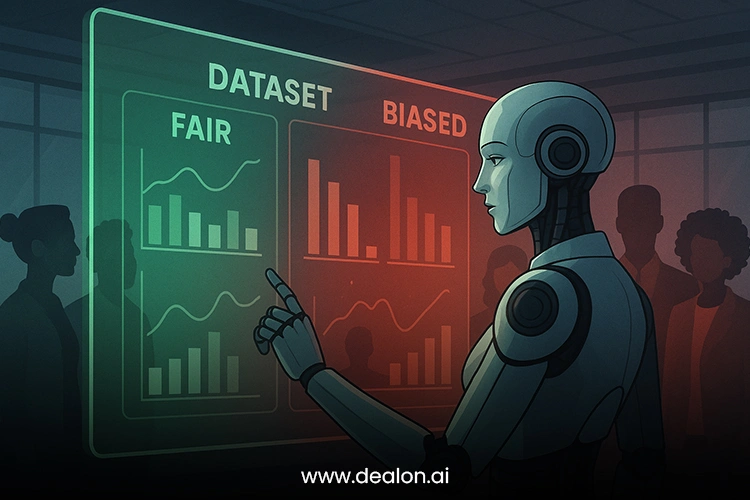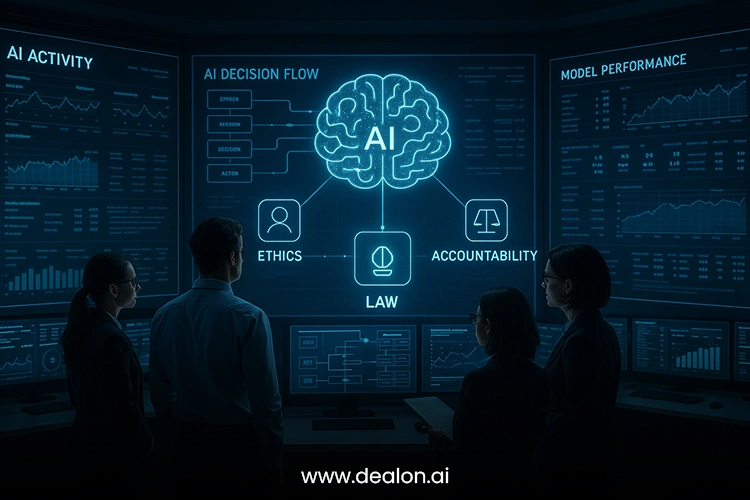The necessity to have a strong AI ethics approach is more urgent than ever in an era when artificial intelligence (AI) is starting to alter industries rapidly. As companies start using the potential of AI to streamline their workflows, use fewer resources to make more data-driven decisions, and stimulate innovation, they will inevitably encounter the ethical side of the problem that will accompany this technological advancement. The potential of AI to transform business operations is excellent, yet, unless approached with ethics actively, there are high chances of bias, discrimination, and a lack of regulatory compliance.
The central problem of these issues concerns the prevalent problem of algorithmic bias. AI systems are trained with previous data, potentially creating new forms of discrimination without the intent of the system developer, so the outcomes are not fair to marginalized groups. It is not only a moral responsibility issue, but it is also a strategic risk. Companies that do not take AI bias early enough will be prone to losing consumer confidence, face legal repercussions, and negative publicity.
In addition, there should be transparency in the process of AI decision-making. As AI keeps penetrating industries such as finance and healthcare, stakeholders need to have more insight into the way algorithms work and make decisions. Firms should not just make sure that AI systems are auditable, but should also articulate their operation to the consumers and the regulators. Such openness builds trust and precludes the chances of backlash, particularly in the era where the general public is continuously questioning the behavior of companies.
An active AI ethics policy is not only about risk reduction, but also an opportunity to make a brand stand out, hire the most talented employees, and promote innovation. Incorporating the idea of ethics into the lifecycle of AI development would not just enable organizations to comply with the current laws but also remain anticipatory of their future legal structures. Such a proactive strategy can help businesses navigate the intricacies of AI ethics without compromising the ethical basis. By doing this, they are establishing a more equitable, responsible, and sustainable digital future.
Also Read: Text-to-Everything: What Multimodal AI Means to the Future
Learning about AI Bias: The Unspoken Threat to the integrity of the business world

Among the most significant issues that businesses will encounter due to AI is the threat of algorithmic bias that is universal. Since AI systems are data-dependent for training, data quality, diversity, and representativeness are crucial. The effects of biased information in artificial intelligence models are extensive because such systems tend to increase the existing social inequalities instead of mitigating them.
As an example, the technology of facial recognition was found to be more prone to error in people of darker skin color, which can lead to harmful repercussions when applied in security and surveillance devices. Equally, discriminatory hiring algorithms could provide support to gender and racial imbalance within the workplace by giving preference to historically disadvantaged candidates, which would in turn create a cycle of inequality.
The consequences of uncontrolled AI bias are not only ethical but can also lead to considerable financial, legal, and reputational losses for the companies. In such areas as finance, biased credit scoring algorithms may affect certain demographic groups more than others, which makes it harder to access loans or credit for marginalized communities. To companies, it not only hurts the trust of the customer base but also leaves them vulnerable to legal suits and regulatory investigations. In extreme cases, such discriminatory actions may cause a social outcry, damaging the image of the company and destroying its authority.
To fight such risks, AI ethics needs to be proactive. The issue of bias requires companies to be dealt with at the initial stages of the AI development life cycle. This entails questioning the datasets provided to train the algorithms to make sure they are different, inclusive, and not biased by the past. Continuous audits and fairness measurements in the process of model development and deployment are essential measures that bring about bias detection, before it can transform into a systemic problem.
These audits cannot be regarded as a single check but as an ongoing process since AI models can change and be biased unintentionally over a period. The adverse effects of biased AI use can be avoided by organizing mechanisms that continuously check on and correct bias, thus avoiding the impacts of such practices across extended periods.
The Function of Transparency: Developing Trust with Consumers and Stakeholders

In the contemporary world that is becoming more and more data-driven, transparency is one of the pillars of ethical use of AI. With AI systems infiltrating all areas of business, such as customer service chatbots and automated loans, stakeholders, such as consumers, regulators, and advocacy groups, want to know how these systems work. Distrust and suspicion may arise due to the lack of openness in the AI processes of decision-making. It is of interest, especially in situations where AI systems have a role in most vital sectors of society, including healthcare, criminal justice, and finance, where the stakes are high and the results of biased or unclear decision-making are dire.
Transparency is not just about making it known that AI is in use. It involves creating clear and easy-to-understand descriptions of how algorithms work, how their decisions are made, and the information that is used to make these decisions. As an example, an organization that employs AI in its recruitment process must be capable of justifying why a candidate has been hired or not, according to a particular set of criteria in the context of the algorithm. This type of transparency will encourage more people to understand and trust AI in the decision-making process. This transparency, in turn, decreases the chances of an adverse backlash and makes the company sound like an ethical and responsible one.
In addition to enhancing trust, transparency also facilitates accountability, an essential ethical concept of AI. Explainable and auditable AI systems can be monitored to identify any flaws or biases, and remedies can be made quickly. This results in a sense of responsibility where the companies are getting actively involved in reducing the risk posed by AI, not waiting until pressure or an incident arises to force them to change. Moreover, transparency can decrease the divide between consumers and organizations that use AI technologies to inform them about the use of their personal data.
Furthermore, open AI systems play a central role in the realization of adherence to the fundamental ethical values like fairness, equity, and justice. An open dialogue on the application of AI will allow companies to show their intention to avoid discrimination and ensure that their technologies will not be used to take advantage of susceptible groups. This transparency can mitigate the issue of surveillance, violations of data privacy, and discrimination by algorithms, all of which have been objects of popular discussion in the era of big data.
Responsibility and Supervision: The Keystones of Ethical AI

With the incorporation of AI in business activities moving forward, it is essential to have well-formed governance frameworks to make sure that AI technologies work in a manner that is ethically and responsibly. Accountability is one of the basic elements of AI governance. Organizations should not just create AI systems that can meet their business goals but also ensure they bear the external impact of their implementation on society at large. The effect of AI on privacy, human rights, economic opportunities, and social equity requires that companies take proactive measures in managing their AI systems and that they follow ethical standards.
A cross-functional team that specifically monitors AI ethics is one of the most effective methods of ensuring accountability in AI machines. These teams need to have data scientists, ethicists, legal experts, and compliance officers- each one of them is essential in examining AI applications at different phases of development, deployment, and operation. Integrating individuals with varying levels of expertise into a company will help reduce the risks of algorithmic biases, data privacy, and possible legal traps. This interdisciplinary methodology helps gain a more in-depth insight into the ethical, legal, and technical nuances offered by AI.
Ideally, the responsibility of AI systems is to be held accountable by having in place a set of comprehensive policies that are effective, enforceable, and responsive to new conditions. Trained AI systems must pass through a strict audit to spot and limit the detrimental decisions. This involves the creation of clear channels through which errors or unreasonable results of the AI systems can be handled, whether it is through unfair hiring algorithms, discriminatory lending algorithms, or discriminatory law enforcement tools.
Strict auditing and monitoring of AI systems guarantee that they are in accordance with the ethical standards during the lifecycle. Moreover, periodic revision of such systems is necessary to suit the changing demands of society, and jurisprudence needs to promote a dynamic atmosphere of constant development.
Another of the crucial advantages of good governance is that it can involve stakeholders in the process of AI development. Consultations with stakeholders regularly, be it employees, customers, regulators, or even outsourced specialists, can guarantee that AI systems are aligned with the ethical principles of society. Such interactions establish an open feedback process whereby organizations will be able to deal with issues before they turn into significant problems. Proactive stakeholder involvement is a way of not only establishing trust and credibility among the people but also creating a sense of collective responsibility within an organization. An organization that is responsible and is willing to practice ethical AI is in a better position to spearhead this revolutionary period.
Legal Compliance and Risk Management: Negotiating the Regulatory Environment
The AI regulatory environment is evolving fast due to increasing awareness of the benefits and threats, such as the bias that AI can bring to society. Governments and other international bodies are implementing rules to not only combat the good, but also the evil that is the biased system of AI. One of these laws is the GDPR, or General Data Protection Regulation of the European Union, which establishes strict standards on data privacy and protection of personal information, particularly to reduce bias in AI systems. The upcoming Artificial Intelligence Act will prioritize high-risk AI systems so that they comply with robust safety, transparency, and accountability principles and overcome the bias that may corrupt the AI results.
These changing regulations pose a challenge to a business in a multi-jurisdictional setting since firms are now forced to manoeuvre through a tangled web of local, regional, and international legislation, all of which should consider the aspect of bias. Lack of adherence to these legal systems can result in monetary fines, ruined reputation, and lengthy litigation, and all of this is exacerbated by biased AI decision-making.
This is why it is highly relevant to integrate both legal compliance and an active attitude to eradicating bias in terms of reducing these dangers. In this way, businesses will be able to not only adhere to the current laws but also be responsive to any future changes in regulations that could be implemented to address the emerging issues of AI bias.
Besides, an active AI ethics policy has a number of strategic advantages that are not merely about the law. Firms addressing AI bias mitigation efforts will be in a better position to be leaders in their industry, not just due to their technological creativity, but also their responsibility in dealing with bias and corporate responsibility.
The more consumers, investors, and regulators focus on fairness and removing bias in AI, the more businesses that incorporate ethical AI will gain competitive advantages, including better customer relations and brand image, and will reduce legal liability involving biased decision-making. The companies will avoid costly errors and stay ahead of the bias-related challenges in the future by taking into account possible regulatory requirements and integrating them into their AI development cycles.
The ethical governance of AI that puts a priority on minimizing bias allows companies to enhance public trust, reduce risks, and innovate responsibly in the long term. To avoid being drawn into the pit of biased systems, AI regulation should take a lot of foresight, flexibility, and strong moral principles. By instilling these ideals into their operational DNA, companies can make sure that not only are their AI tools strong, but also discrimination-free, not just to protect their profit margins, but also their reputation in the more socially conscious world.
Business Benefits of Proactive AI Ethics: A Competitive Advantage
The proactive AI ethics approach will give businesses a tremendous competitive edge, with both practical and non-practical advantages. To start with, it increases brand equity and consumer loyalty. With the world becoming more and more conscious of whether a company they patronize is ethically responsible in its operations, an adherence to responsible AI may be a distinguishing feature of a company. When consumers can rely on organizations that are transparent, fair, and accountable in their AI systems, they will be more willing to use them.
Second, AI ethical practices lead to innovations. As firms adopt systems that make AI systems transparent and devoid of bias, they can create a pathway to more inclusive, effective, and meaningful solutions. These codes of conduct promote the production of products, ensure the growth of the market, and increase customer satisfaction. Moreover, companies that have a robust ethical base can streamline operations, minimize inefficiencies, and come up with innovative technologies that translate to a more sustainable competitive advantage.
Lastly, a solid AI ethics policy makes the company a desirable employer. With the increase in the need for ethical AI professionals, the more organizations integrate such principles into their values, the higher the chances of attracting top-tier talent. Data scientists, engineers, and AI ethicists are already gravitating toward the companies that show a certain level of social responsibility in the development of AI.
Conclusion
The proactive attitude towards AI ethics is no longer optional as AI keeps on influencing the business environment. Organizations can not only reduce risks by countering bias, promoting transparency, and establishing effective frameworks of governance, but also achieve substantial business gains. Ethical AI creates consumer trust, innovation, and attracts the best talent, which makes companies leaders in a competitive market. With the changes in the regulatory environment, the business that has progressed its ethical AI activity will not only adhere to new regulations but also improve its brand value, performance, and future sustainability, which will help it build a responsible and profitable future.

